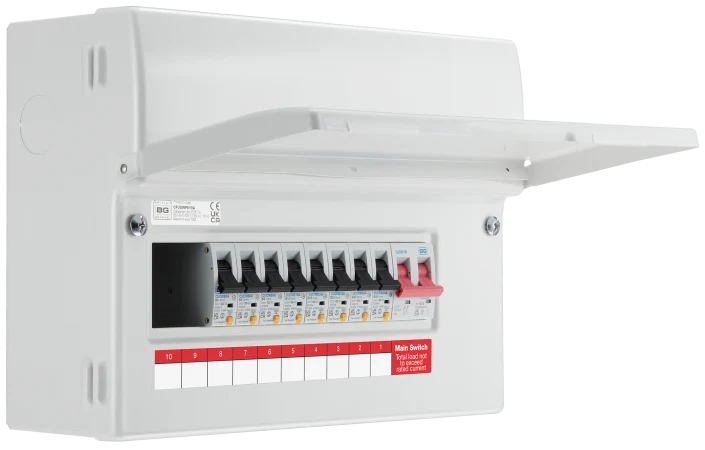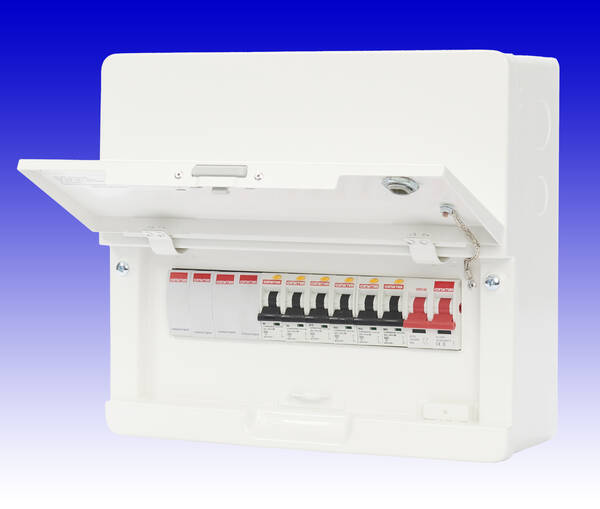Why Updating to Advanced RCBO CONSUMER UNITS is Essential for Safety
Why Updating to Advanced RCBO CONSUMER UNITS is Essential for Safety
Blog Article
The Role of Consumer Devices in Effective Power Administration Equipment
Customer devices are essential to efficient energy administration systems, acting as the key distribution points for electrical power within structures. By integrating circuit breakers, they protect circuits from possible overloads, therefore maintaining safety and protecting against substantial blackouts. The introduction of wise modern technologies has actually further improved their capability, permitting for real-time information tracking and nuanced energy usage analysis. This combination not just maximizes power usage however additionally promotes the consolidation of eco-friendly power sources, thus advertising lasting methods. Exactly how, then, do these innovations translate to tangible benefits in daily energy administration?
Recognizing Customer Systems

Comprehending the function of consumer units begins with recognizing their necessary feature in guarding electric systems. By separating faults within particular circuits, customer devices prevent extensive blackouts and prospective fire hazards. This isolation is attained through using breaker that trip or merges that blow when a mistake is found, thus reducing off the electric flow to the affected circuit.
In addition, customer units facilitate the well organized circulation of power, boosting the performance of energy usage. They permit the systematic monitoring of electrical lots, which can be especially important in industrial and business settings where demand can fluctuate considerably. Properly kept customer systems add to the longevity of electric systems and help in decreasing downtime triggered by electrical failures, ultimately supporting the seamless procedure of energy-dependent facilities.
Smart Technologies Assimilation

A key advantage of clever consumer devices is their ability to leverage progressed formulas and artificial intelligence for predictive analytics. This enables preemptive changes based upon usage patterns, weather condition forecasts, and various other variables, substantially raising overall effectiveness. Smart consumer devices assist in need reaction programs, where power use can be dynamically adjusted during height durations to maintain the grid and reduce costs.
The integration of sustainable energy resources, such as solar and wind, is additionally structured via smart customer units. By smartly managing the intermittency of these sources, these units make sure a well balanced and reputable power supply. Additionally, wise customer systems enhance customer interaction by offering detailed insights and remote capabilities through mobile applications, fostering an extra aggressive strategy to power preservation and sustainability.
Surveillance Energy Consumption
Structure on the abilities of smart modern technologies integration, checking power intake becomes an important focus within energy management systems. Reliable monitoring acts as the foundation for identifying energy inefficiencies and implementing restorative steps. By leveraging sophisticated metering infrastructure (AMI), real-time information on energy use can be collected at granular levels, supplying important understandings right into usage patterns and peak demand periods. This data-centric approach enables both customers and energy supervisors to make educated decisions focused on lowering waste and improving general effectiveness.
Smart meters and Web of Points (IoT) tools play a pivotal function in this surveillance procedure. These have a peek here devices can track energy usage in real-time, sending data to central systems for evaluation.
The integration of these technologies not just equips consumers with detailed details about their energy usage however additionally supports utility companies in handling lots distribution better. Eventually, continual and accurate monitoring is essential for attaining power effectiveness, cost financial savings, and sustainability objectives within energy management systems.
Optimizing Appliance Use

One effective approach entails recognizing height and off-peak hours to change energy-intensive tasks, such as laundry or dishwashing, to times when energy demand is lower. This not only lessens pressure on the grid however additionally maximizes lower energy tariffs. Furthermore, integrating artificial intelligence algorithms permits anticipating upkeep, making sure devices run at optimum efficiency and extending their life-span.
Energy monitoring systems can also incorporate user-specific preferences and behaviors to tailor appliance use schedules. For instance, wise lighting systems can change illumination based on occupancy and all-natural light accessibility, while heating and cooling systems can preserve convenience levels without excessive power usage.
Promoting Sustainability
Promoting sustainability within power management systems includes not just enhancing effectiveness however likewise promoting ecologically accountable techniques. Customer units are essential to this process, as they give real-time information and control devices that make it possible for customers to monitor and reduce their power intake. By leveraging sophisticated technologies, customer devices can recognize energy-saving opportunities and assist in the integration of renewable power sources like solar and wind power.
One essential aspect of promoting sustainability is educating consumers on the benefits of liable power usage. Through thorough insights supplied by consumer units, users can make enlightened decisions that lessen their carbon footprint. For example, these devices can recommend optimum times for operating high-energy appliances based on grid demand and renewable resource schedule, therefore minimizing dependence on nonrenewable fuel sources.
In addition, customer devices sustain the fostering of clever grid modern technologies, which boost the total effectiveness and dependability of power distribution. By allowing two-way interaction between customers and utility companies, these systems can dynamically adapt to energy demands, minimizing waste and advertising using lasting power methods.
Verdict
Customer devices, as important components of energy administration systems, considerably improve electrical security and performance within structures via circuit security and clever innovation integration. Furthermore, the unification of renewable power sources advertises lasting techniques, adding to lowered overall find power consumption and lower carbon impacts.
Advancements in smart innovations have actually revolutionized the capabilities of energy administration systems, specifically through the integration of clever consumer devices.Building on the abilities of clever innovations combination, checking power intake ends up being a vital emphasis within energy monitoring systems.Efficient home appliance use optimization is a critical part of power management systems, intending to enhance effectiveness and minimize unnecessary power usage.Customer systems, as integral components of power management systems, substantially improve electric security and performance within buildings via circuit protection and clever modern image source technology combination. Furthermore, the incorporation of eco-friendly power sources promotes lasting techniques, adding to decreased total energy usage and lower carbon footprints.
Report this page